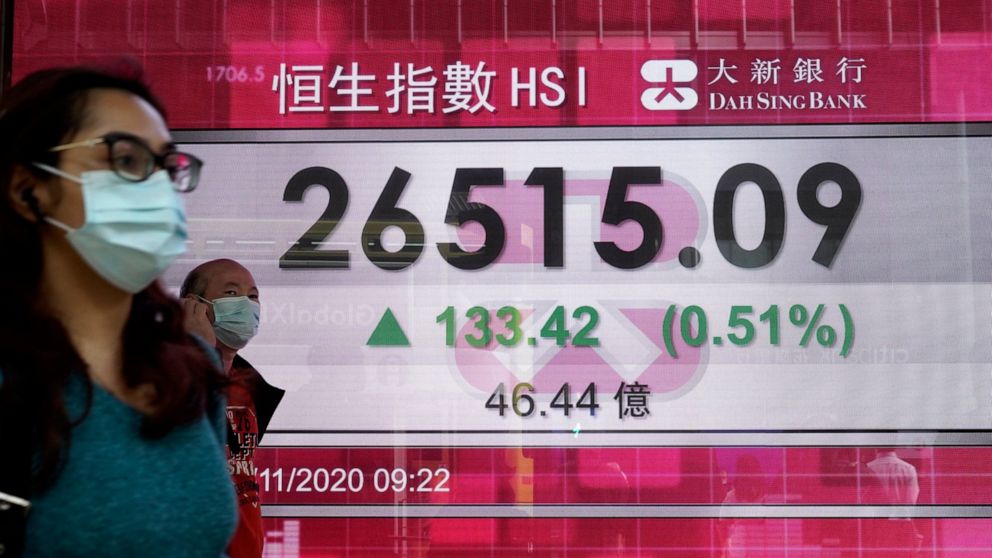Some Asian shares buoyed by news on coronavirus vaccine
Asian shares are mixed, as some indexes lost earlier gains buoyed by optimism a vaccine may soon control the coronavirus and the economic destruction it’s caused
TOKYO — Asian shares were mixed Tuesday, after the Dow Jones Industrial Average hit a record high on optimism that a vaccine may soon control the coronavirus and the economic destruction it’s caused.
Moderna said its COVID-19 vaccine appears to be 94.5% effective, according to preliminary data. It’s the second time this month that a company unveiled such encouraging numbers about a vaccine, boosting hopes that the global economy can return to some semblance of normal next year.
Japan’s benchmark Nikkei 225 rose 0.3% to 25,994.37 in afternoon trading, after momentarily reaching a 29-year high of above 26,000 earlier in the day.
Australia’s S&P/ASX 200 gained 0.2% to 6,498.20. South Korea’s Kospi lost earlier gains and slipped 0.2% to 2,537.94. Hong Kong’s Hang Seng edged down 0.1% to 26,349.91, while the Shanghai Composite slipped 0.4% to 3,332.54.
“The vaccine driven fervor had continued into the fresh week with even better trial results further inspiring markets to anticipate a virus-free reality in the not too far away future,” said Jingyi Pan, senior market strategist with IG in Singapore. “Asia-Pacific markets continue to bask under the vaccine glow.”
Even as a fresh surge of COVID-19 infections hit Japan, the economy marked a rebound in the third quarter. The recovery is still not at pre-pandemic levels, but such signs are raising optimism about things returning to business as normal in the world’s third-largest economy.
Fitch Solutions Country Risk and Industry Research revised its growth projection for Japan this year to a more moderate contraction of 6.3%, from an earlier forecast for an 8.8% contraction. For 2021, Fitch projects a return to 2.7% growth in 2021, which is better than its earlier forecast for 2.1% growth.
“In 2021, we believe that the holding of the summer Olympics as well as the likely availability of a COVID-19 vaccine could likely lead to a sharper upsurge in domestic demand, driving our forecast revision,” it said.
The Tokyo Games have been postponed a year to the summer of 2021.
On Wall Street, stocks of companies that would benefit most from an economy busting out of its forced hibernation, such as airlines, movie theaters and banks, led Monday’s rally. The trend was basically echoed in Asia.
At the same time, pandemic-winning stocks that benefited from lockdown orders like Amazon and Zoom Video Communications lagged as they no longer looked like the only safe bets to play.
The Dow jumped 470.63 points, or 1.6%, to 29,950.44. It surpassed its prior closing record of 29,551.42, set in February before pandemic panic sent stocks plunging.
The S&P 500, which matters more to the performance of most 401(k) accounts, added to its own record set on Friday. It rose 41.76, or 1.2%, to 3,626.91. The Nasdaq composite gained 94.84, or 0.8%, to 11,924.13. It lagged the rest of the market amid lessened interest for tech stocks.
Risks remain for global markets. Even if one or both vaccines are finally approved, it’s still uncertain when they could be widely distributed.
The pandemic is continuing to worsen, with rising coronavirus counts across the United States and Europe pushing governments to bring back varying degrees of restrictions on businesses. Some areas of the U.S. economy have been slowing, particularly after big financial-support programs from Congress expired.
“The vaccine could help people breathe a sigh of relief, but the devil is in the details,” said Gene Goldman, chief investment officer at Cetera Financial Group, referring to the need for more complete data and eventual distribution plans.
In energy trading, benchmark U.S. crude oil climbed 27 cents to $41.61 per barrel amid hopes that a healthier economy would burn more fuel. Brent crude, the international standard, rose 36 cents to $44.18 per barrel.
In currency trading, the dollar declined to 104.52 Japanese yen from 104.90 yen. The euro cost $1.1854, down from $1.1845.
———
AP Business Writers Stan Choe and Damian J. Troise contributed.
![]()


